Coffee leaders from across the industry gathered at the Taj Cape Town for the first ever Allegra South Africa Coffee Leader Summit on February 26
Focussing on the theme ‘building a stronger future together’, attendees from leading established chains and independents alike discussed key issues facing the South African coffee industry today.
For the local coffee community, the event was testament to the success of South Africa’s burgeoning coffee market. Speakers reflected on the industry’s collective achievement, but more importantly looked to the opportunities ahead. Among the many issues covered, there was much common ground on promoting inclusivity and diversity, which delegates agreed was essential as the industry enters a new, exciting phase of growth.
From training and skills, sustainability, innovation, the speciality scene and much more, here are the highlights from the who’s who list of speakers.
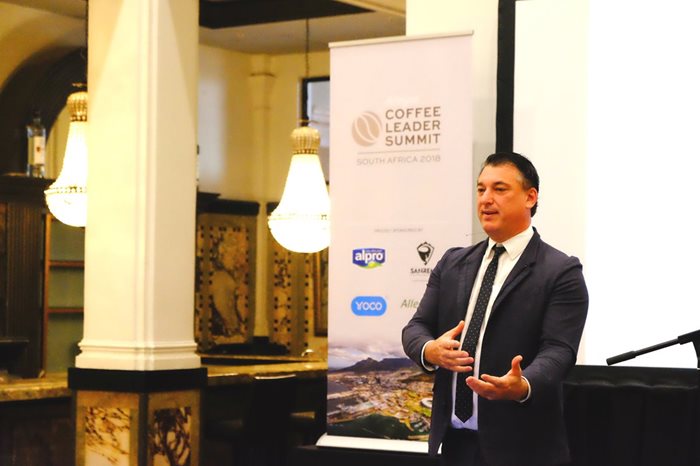
Global Mega Trends and the Future of the Coffee Shop Industry
Jeffrey Young, CEO and Founder Allegra Group
Welcoming attendees to the inaugural South African Coffee Leader Summit, Young heralded 20 years of industry growth and praised coffee’s appeal to huge cross-sections of society.
Accessibility, he said, was the industry’s greatest asset for continued success. Noting the cross-pollination of ideas between large chains and independents, Young said both groups were feeding back innovation to offer new products and improve customer experience.
Highlighting the importance of individualised concepts across chains, Young said consumers were no longer interested in a cookie-cutter approach to expansion. On the artisan trend sweeping the industry, he heralded the emergence of the ‘5th Wave' operators expanding quality at scale. Outlining Allegra research predicting continued growth in the branded chain sector, Young told delegates that adopting a boutique mindset was essential for future success.
Baristas are playing a vital role in educating consumers, with every dialogue about coffee and every great story told
Praising the rise of speciality operators in South Africa, Allegra’s CEO highlighted the country’s merging micro-roasters the adoption of craft filter methods and introduction iced beverages. The potential for the latter product is huge, he explained, citing the huge popularity of cold coffee in the US.
He also praised artisans for fostering generating consumer enthusiasm for coffee at-home. This excitement he said, had driven demand for specialty and origin coffees in-store and the adoption speciality coffee among everyday consumers. Sounding a note of caution, however, Young urged artisan roasters against complacency as bigger players continually improve and adapt their offerings.
Engaging the resourceful, independent and self-learning millennial demographic was essential to the success of the 5th Wave, said Young. He also credited millennials with driving quality and expectations, saying the demographic had revitalised the social potential of coffee shops as places to meet, work, and study.
Praising the role of baristas as ambassadors of the industry, Young highlighted the role’s journey from “simply making the coffee” 20 years ago to professional careers and the prestige of the World Barista Championships and Coffee Masters today. Baristas are playing a vital role in educating consumers with every dialogue about coffee and every great story told, he said, adding that authenticity are crucial qualities for all coffee shops to thrive.
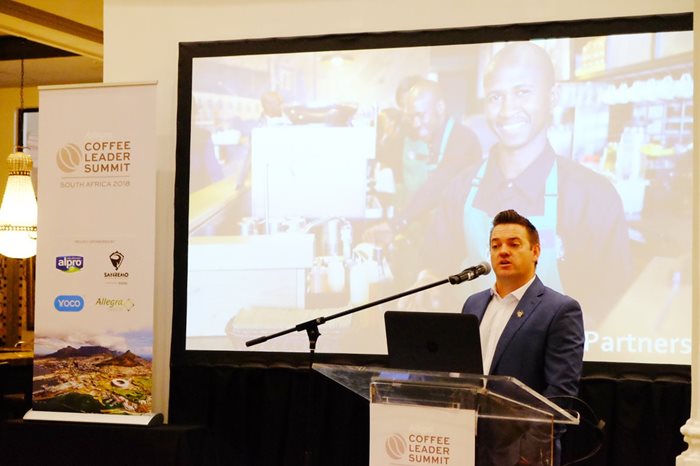
More than just coffee
Kickstarting the line-up, Starbucks’ Clive Liversage gave an upbeat assessment of coffee’s role in South African society. Highlighting skills and training for the disadvantaged, Liversage praised the work of non-profit 'Changing Lanes', which is training a new generation of baristas in collaboration with Starbucks’ ‘Masters’ programme.
For consumers, Liversage said Starbucks aspired to offer experiences alongside coffee. Highlighting that every Starbucks outlet in the country offers free wi-fi, Leversage said enabling connectivity was essential to widening the scope of activities possible in-store. Personalisation is also highly important, he explained, citing Starbucks’ Rewards app as a powerful tool for engaging South African consumers.
Enabling connectivity is essential to widening the scope of activities possible in-store
With Starbucks planning further expansion, including its first Cape Town store in 2018, Liversage celebrated great potential in the South African coffee market. Continuing its development in the country, Starbucks will roll out a new drive-through format and cold brew will be served for the first time in South Africa this March, Liversage confirmed.
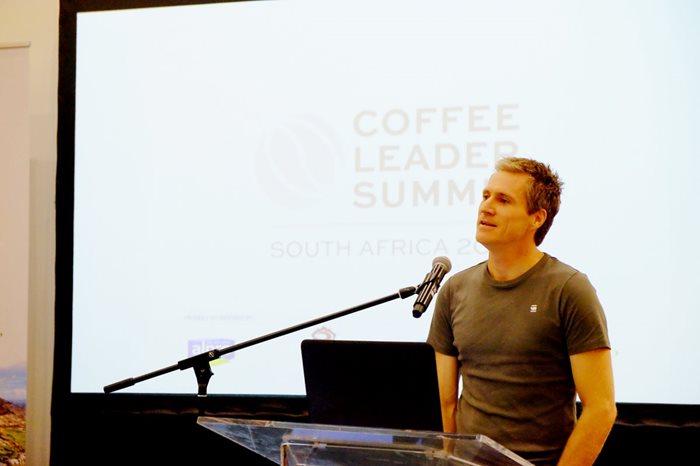
Keeping sight of core values
Peter Howie delivered a fascinating account of his role establishing Seattle Coffee Company in South Africa. One of the country’s first branded coffee shop chains, Howie said the brand’s success was hard won through a passion for coffee and consumer engagement.
As a young graduate with zero coffee knowledge, in 1996 Howie was thrown in the deep end working as a barista at Seattle’s London flagship store. That illuminating experience forged a life-changing passion for quality coffee and great customer service.
Artisanal offerings are crucial to Seattle’s business model and instrumental in generating consumer interest for new products
Howie spoke about the challenges of operating in an undeveloped market and building an effective franchise base. Despite learning many lessons the hard way, 20 years’ dedication to quality, customer experience and staff development was ingrained in Seattle’s brand DNA.
Today, artisanal offerings are crucial to Seattle’s business model and instrumental in generating consumer interest for new products. A partnership with UK-based Union Roasters had been instrumental in attaining supply chain oversight and developing invaluable expertise, Howie explained.
Hailing the success of independent chains in driving South African innovation, Howie cautioned that speciality coffee must be inclusive to all customers. Seattle’s philosophy was always to “lose a lot of the rules” and to promote a customer-first approach. Acknowledging that South African consumers often follow different trends to their global counterparts, Howie said “we celebrate who you are, so be who you are.”
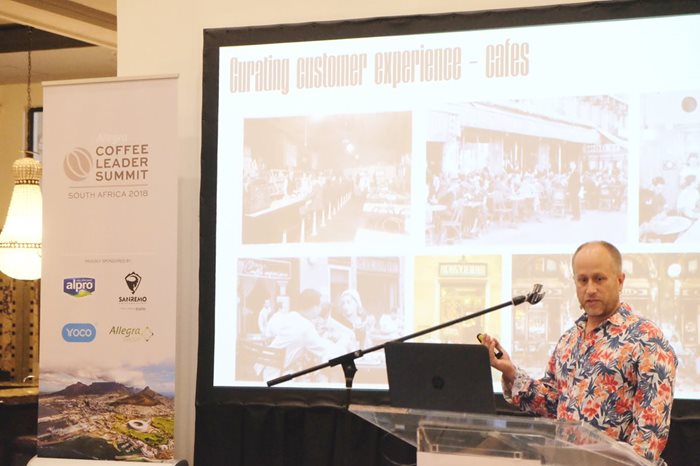
The sharp end of speciality coffee
South African speciality coffee has come a long way in the last decade, but the most exciting chapter is only just beginning, said Joel Singer. The Origin founder praised speciality coffee shops for promoting quality, knowledge and skills and hailed their dedication to boosting the nation’s global reputation. Looking forward, Singer urged the industry to capitalise on a decade of progress and promote South Africa as speciality coffee hub to rival Melbourne, New York or London.
Just 20 years ago it was an uphill struggle to convince operators that customers would value high-quality beverages served by trained baristas
Harking back to the days of badly extracted espressos, overheated milk and chocolate sprinkles, Singer recalled a time when “nobody really believed there was a place in the market for high-quality, locally roasted coffee.” Just 20 years ago, it was an uphill struggle to convince operators that customers would value high-quality beverages served by trained baristas. In fact, many were bemused at the prospect of barristers pulling espresso shots, he not entirely joked.
Celebrating the hard work of the speciality coffee industry, Singer hailed South Africa today as a nation of latte art and espresso champions competing among the best in the world. He praised the work of fellow operators for raising the profile of barista skills, wages and professional equipment, adding that Origin alone had trained 3,000 baristas since inception. However, the industry must work hard to retain coffee professionals as both independents and large chains were drawing from too small a talent pool.
Highlighting the vital role cafés play in shaping urban culture in South Africa, Singer urged the industry to harness their potential for creativity, innovation and recreation among consumers. A focus on diversifying experience-led offerings is one of the best ways to encourage growth industry growth, he said.
Delegates were also urged to broaden coffee’s appeal among consumers. Cautioning over becoming too insular, Singer said the industry should constantly seek inspiration outside familiar territory and engage broader demographics with enthusiasm for premium coffee.
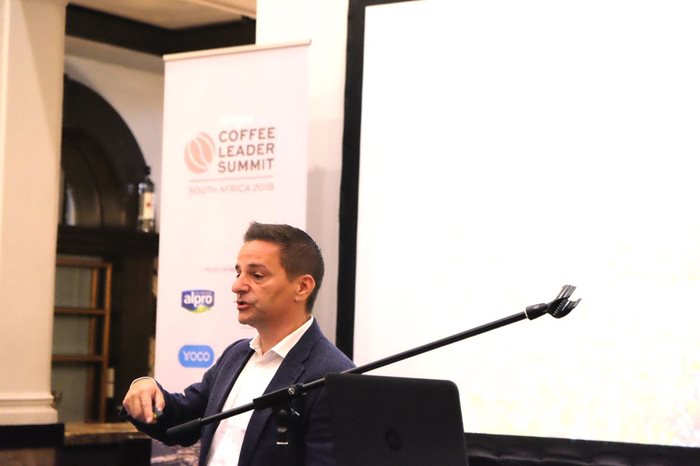
Three reasons why dairy alternatives are changing the global coffee scene
Eric Derie, Head of Foodservice EMEA Alpro
Alpro’s Eric Derie outlined key reasons why the coffee industry should embrace dairy alternatives. No longer the preserve of vegan and lactose intolerant demographics, everyday consumers are now driving demand for dairy alternatives.
The coffee industry should capitalise on the burgeoning global appetite for health and wellness
Of the 54 countries Alpro operates in, research shows the ‘wellbeing and balance’ demographic make up half of the soy-based food and beverage firm’s customers. This young, health and environmentally-conscious group should be a key focus for the coffee industry to capitalise on the burgeoning global appetite for health and wellness, urged Derie.
Sustainability is another key way in which dairy alternatives can support growth within the coffee industry. Derie told delegates that soy cultivation requires just half the land needed for dairy production, with the added value of reducing the need for feed-stock land. The next commonly available alternative, almond, can be sourced from the Mediterranean instead of California to ensure environmental scrutiny, he explained.
While plant-based alternatives are lower in sugar and fat, taste is still the main factor behind consumer choice. Derie said almond was most accessible to consumers, but that other flavours, such as coconut, are popular with coffee drinkers. With this in mind, Alpro creates products for baristas, enabling coffee shops to capture the one-in-four coffees taken white. Boutique operators can benefit from dairy alternatives too, with health and wellbeing consumers more willing to buy higher-cost beverages.
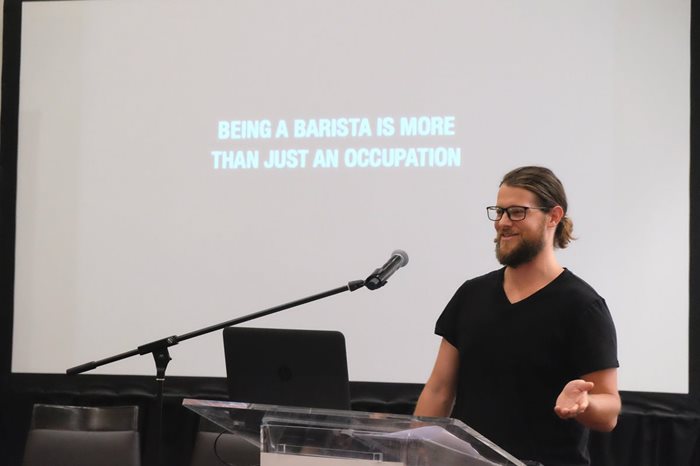
A word of encouragement
David Bassett, Founder Woza Coffee
David Bassett, founder of social enterprise, Woza Coffee, gave an uplifting talk on how the South African coffee community is changing lives for the better. Praising the work of individuals, businesses and big brands in creating opportunities for underprivileged groups, Bassett he was “proud to be associated with the industry.”
Bassett outlined the role of the Woza School in providing training and employment for a new generation of baristas. Aiming to be a fully sustainable, self-funding social enterprise, the initiative creates employment opportunities with its training programme. Asserting that “a foot in the door is better than a hand-out,” Bassett explained skills opportunities were pulling at-risk groups out of poverty and giving people a stake in society. More than just an occupation, he said being a barista provides social standing and opens opportunities.
If the industry continues caring about coffee and the people it serves it can become the most ethical, environmentally and socially aware industry in the country
Bassett again praised the work of delegates in lowering youth unemployment, giving people fresh starts and improving South Africa’s international standing. He also acknowledged the hard work of the coffee industry in saving rainforests, contributing to healthcare in war-torn countries and providing communities with fresh water.
In addition to creating meaningful jobs, the coffee industry provides a major contribution to South Africa’s dynamic economy.
Bassett said every new café provides more venues for freelance workers, business meetings and creativity. "If the industry continues caring about coffee and the people it serves it can become the most ethical, environmentally and socially aware industry in the country,” he said.
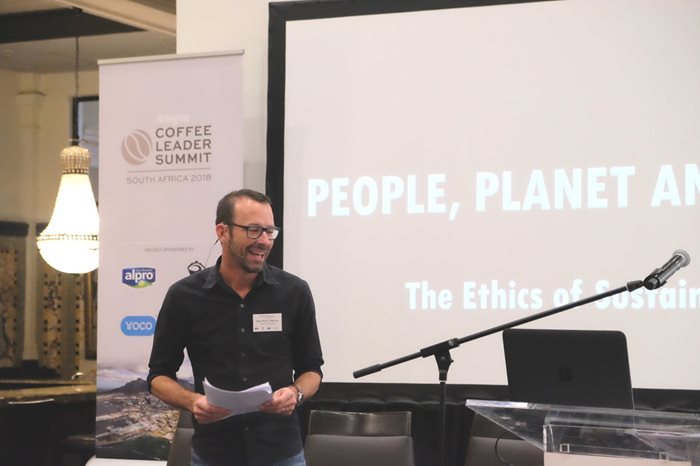
People, planet and coffee – the ethics of sustainable coffee
Jonathan Robinson, Managing Director Bean There Coffee
Jonathan Robinson urged a holistic approach to fair trade and sustainability across supply chains. As a passionate advocate for ethics, Robinson said his firm’s mission had always been to make a difference at all levels of coffee production. Outlining Hasbean’s Fairtrade model, he said the business’ intrinsic sense of fairness extends from producers to employees and to end-consumers.
Fostering loyalty among suppliers boosts the reliability and quality of supply chains
Robinson asked delegates to question their pricing policies, citing efforts by Bean There to maximise revenue for farmers. Operating in this way meant Bean There was able to foster loyalty among suppliers, thus boosting the reliability and quality of supply chains. The result, said Robinson, was a win-win situation for all.
The definition of a ‘living wage’ should also be challenged, he said, explaining Bean There's efforts to re-evaluate staff pay. Customers too should pay a fair margin for products and businesses should rethink pursuing “profit at all cost.” Simply paying a percentage of earnings to charity was not enough, he urged, adding that profit should be also be defined in ethical supply chains and reducing environmental impact.
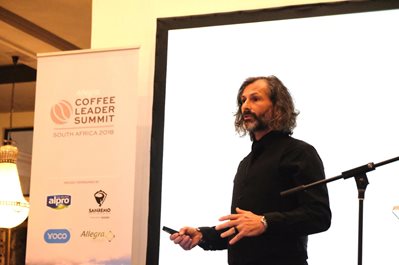 Balancing the juxtaposition of luxury with inclusivity
Balancing the juxtaposition of luxury with inclusivity
David Donde delivered a sobering address on why coffee businesses must embrace inclusivity. Highlighting recent global diversity movements, Donde called on delegates to promote inclusivity across baristas, management and at board level.
Acknowledging that every coffee business, including his own, can do more to broaden appeal, Donde said it was vital the industry normalised sexual-orientation and gender equality to ensure long-term prosperity. In a changing world, the coffee industry must adapt or risk alienating future consumers. Adding that there is “nothing in the way” of consumers adopting high-end coffee, Donde said that inclusivity was the one simple way ensure full market potential is attained.
Businesses need to be built to last. Inclusivity is a vital quality of any truly sustainable business
Asserting that the coffee industry should “never be ashamed of its tribe”, Donde said he was proud to work in such a diverse industry. However, external sustainability only mattered so long as there was internal sustainability. Businesses need to be built to last, he said, adding that inclusivity is a vital quality of any truly sustainable business.
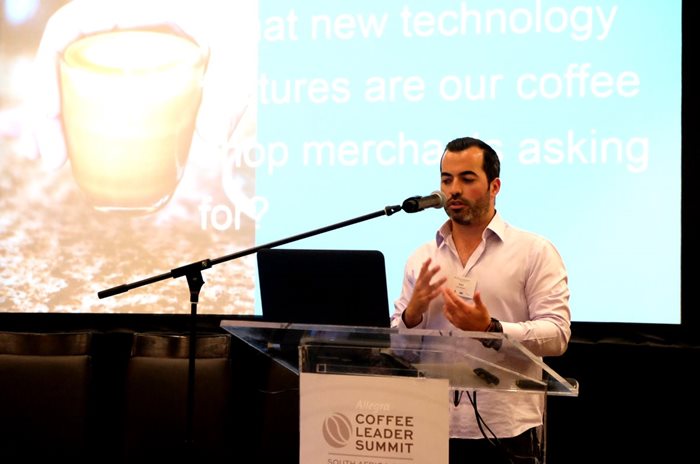
Using technology to drive growth in the South African Coffee Industry
Carl Wazen, CBO and co-founder Yoco
Highlighting the symbiosis between coffee shops and emerging tech platforms, Carl Wazen detailed Yoco’s empowerment of SMBs across South Africa. He praised small businesses as engines of growth and employment but said limited access to financial tools often impeded prospects. With most systems aimed at established operations, Wazen stressed that “getting paid is often a daily challenge” for small coffee shops.
More than 500 coffee shops across South Africa use Yoco technology, with an estimated 2 million cups of coffee purchased on the platform
To this end, progressing from analogue and cash systems is a vital step, with access to digital metrics essential for securing capital. Outlining Yoco’s goal to “create businesses in a box”, Wazen said his firm was eliminating the need for manual financial processing and enabling greater insight through data capture.
Explaining the crucial role of coffee shops in developing Yoco’s financial tools, Wazen said that getting between customers and their rush hour coffee was the perfect environment to refine smart payment systems. This dynamic allowed Yoco to continuously improve their offering, with card payment tips and loyalty schemes enabling staff to enhance the sales experience.
Joining Wazen on stage was and founder of South African coffee venture, Barista Cup, Gcobani Gogoba. Reflecting on his inspiring journey from waiter to head barista, artisan roaster and coffee shop founder, Gogoba said Yoco technology had been instrumental in driving security, efficiency and expansion in his business.
Today more than 500 coffee shops in South Africa use Yoco technology, with an estimated 2 million cups of coffee purchased on the platform. Praising coffee shops as entrepreneurial hubs, Wazen said that while the Yoco’s reach was initially small, the brand became instantly recognisable because of its involvement with café culture.
Panel Discussion: Big Picture Growth
-
Alpro Head of Foodservice EMEA, Eric Deerie
-
Seattle Coffee Company Director, Pete Howie
-
Starbucks South Africa Managing Executive Clive Liversage
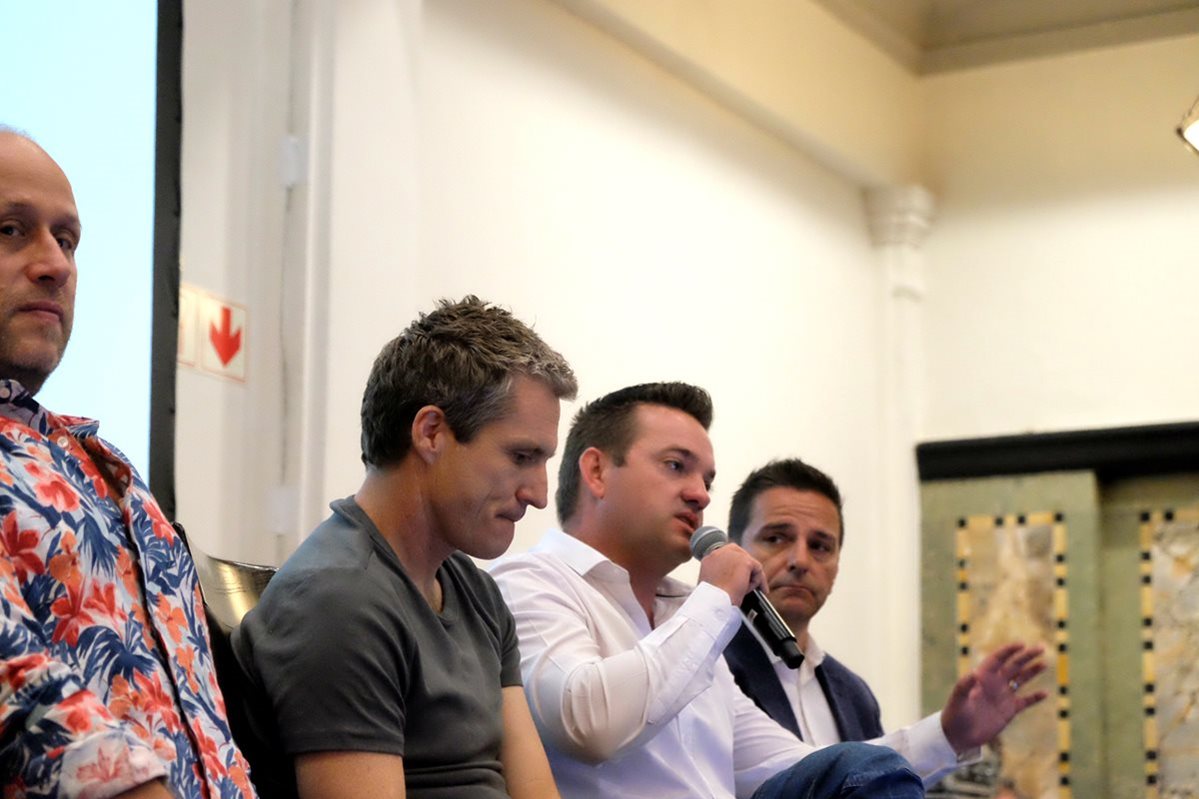
The first panel discussion revolved around the impact of Starbucks’ entry into the South African market and the debate surrounding industry pricing and quality control.
In response to an audience question on why South African coffee prices remain low when equipment costs, resources and wages are increasing, Singer noted the country ranks 80th in terms of global price-per-cup averages. Explaining his belief that the ‘Starbucks effect’ will drive prices up in South Africa, Singer expressed concern that Starbucks’ ability to offer more attractive employment packages may negatively impact the artisanal scene.
Liversage agreed with Singer on the value of good baristas but pointed out Starbucks entered the South African market with slightly below average prices. Howie added that artisanal-focused companies naturally retain smaller margins because of the higher price associated with premium green coffee. He suggested offsetting this by offering better incentives for prioritising quality. In the South African market particularly, he said, there should be more appetite for offering barista skills to disadvantaged groups.
Moving on to Starbucks’ impact on the South African coffee market, Allegra CEO Jeffrey Young asked whether the big chain’s arrival was a “seismic moment” or simply the introduction of another competitor.
Singer added that while Starbucks plays a heavy-lifting role in terms of growing the overall market, their products are not considered speciality and therefore would not impact Origin’s customer base. “The bigger the industry, the bigger the specialty market,” he said.
Liversage added that Starbucks was keen to participate and grow the market, particularly though close collaboration with the independent market. He also noted that typical Starbucks customers were millennials, who dominate the cold beverage space and account for half of Starbucks’ overall sales. Derie added his belief that Starbucks will continue to catalyse the increasing popularity of non-dairy alternatives.
The panel then discussed comparisons between health and wellness and coffee trends, and suggestion that non-dairy alternatives must be embraced by the South African market. Howie noted the introduction of almond milk in Seattle shops had positively contributed to growth while Derie said communication around dairy alternatives is essential as decision making moves away from ‘free-from’ and towards proactive choice.
Liversage confirmed non-dairy is crucial to Starbucks’ offerings as syrup options and sugar popularity declines. Singer suggested however that health-conscious food was even more important in the specialty scene.
Panel Discussion: Sustainability, Ethics and Speciality Coffee
-
Truth Coffee CEO, David Donde
-
Bean There Coffee Company Managing Director, Jonathan Robinson
-
Red Band Barista Academy Managing Director, Ryan Le Roux
-
Kamili Coffee owner, Theo Snyckers
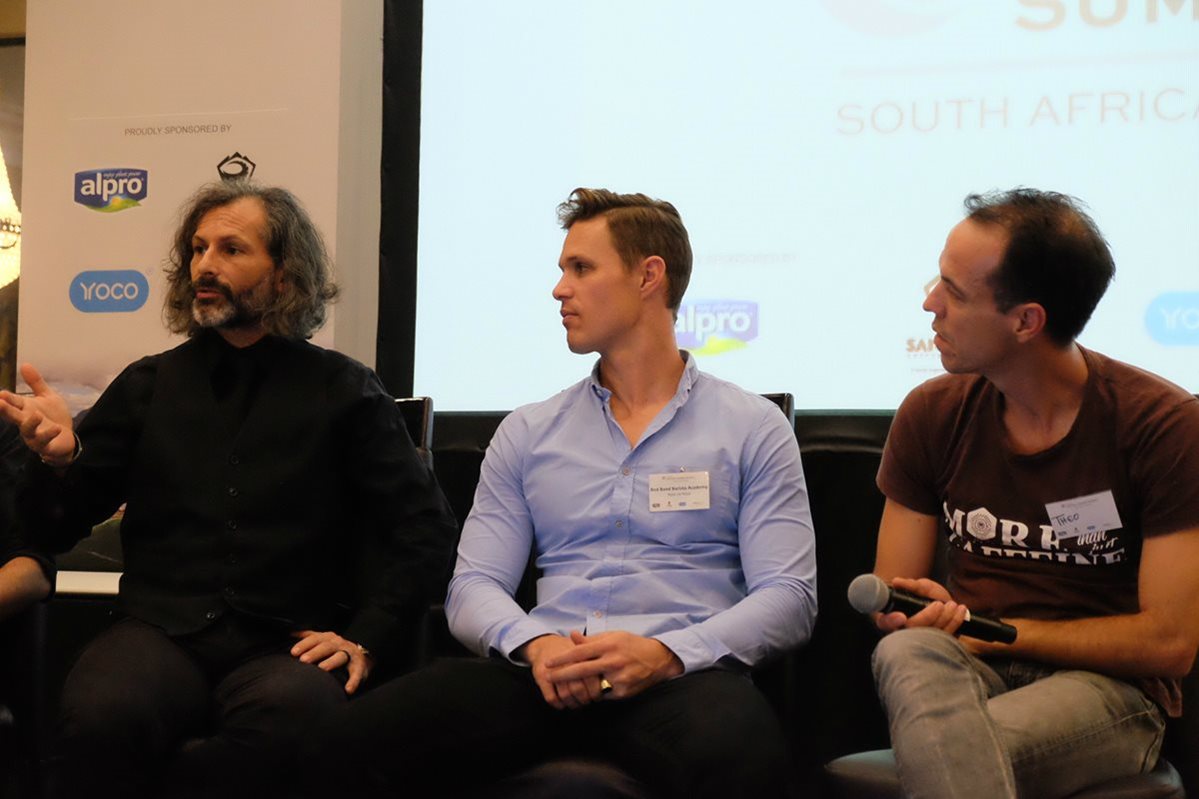
The second panel discussion covered the scalability of specialty coffee, creating career paths in the industry, market value and honesty in speciality coffee.
Donde began by controversially asserting there were no barriers to the scaling South African speciality coffee, citing an endless supply of training potential, energy and enthusiasm. Snyckers agreed in principle but added scalability also refers to continuous brand evolution, not just outlet expansion.
Discussing whether genuine career paths in the South African coffee industry are truly attainable, Le Roux said the industry has capacity to change lives by offering skilled employment to aspirational baristas. However, there are still too few progressive career paths beyond café service into management and ownership, he said.
Robinson said Bean There was dedicated to helping employees develop their skills but also to progress within the company and even externally. He celebrated that a former Bean There barista was now one of the company’s top five wholesale customers.
Discussing quality and value, Donde advocated a macroeconomic reversal for the industry, where higher prices facilitate higher budgets and result in higher quality products. He urged the industry to be unashamed of charging customers for higher quality, but stressed that companies can’t cheat the system.
Donde went on to express faith in the public palate, suggesting consumers are becoming more attuned to premium coffee. Snyckers agreed, stating “my customers can’t be lied to, they are loyal to Kamili’s quality”. Robinson said that he continues to price coffee to ensures fairness through from source to cup while Le Roux explained the real arbiters of quality are baristas. Focusing on training and accreditation would allow baristas to drive out poorer quality products from the market, he said.
The next major Allegra World Coffee Portal event will be the CEO Forum. Returning for its fourth year on November 8, 2018, the high-profile summit will be held in the vibrant Downtown district of Los Angeles.
The exclusive, two-day global gathering of over 200 senior leaders and influencers from across the coffee, café and related food-to-go sectors offers an unprecedented line-up of inspirational speakers, thought leadership and critical business insight.
Register your interest here.